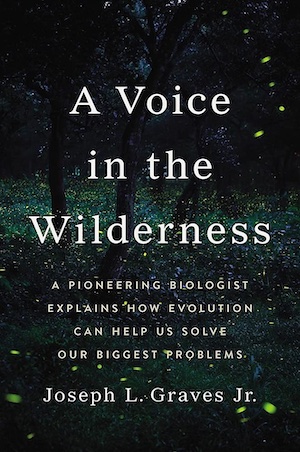Shortlisted for the 2023 Phi Beta Kappa Award in Science
By Julia Steiner
Joseph L. Graves Jr. holds the distinction of being the first African American to earn a Ph.D. in evolutionary biology—a groundbreaking achievement in a field that has historically been misused to perpetuate harmful ideologies about race and gender. Overcoming systemic racial discrimination, poverty, and imposter syndrome, Graves has forged a remarkable career and now teaches at North Carolina Agricultural and Technical State University.
In his latest book, A Voice in the Wilderness: A Pioneering Biologist Explains How Evolution Can Help Us Solve Our Biggest Problems, Graves challenges the misuse of evolutionary biology as a tool for justifying racism and social hierarchies. Instead, he demonstrates how the principles of evolution can be harnessed to promote social justice. Throughout his career, he has sought to reframe the narrative, opposing pseudoscientific concepts like social Darwinism—the misguided belief that only the “fittest” deserve to survive or thrive in society.
The first half of A Voice in the Wilderness delves into Graves’ personal journey and his relationship with evolutionary biology. He reflects on overcoming the challenges of being one of the few Black, working-class science students at Oberlin College and embracing the moniker “Black Darwin.” Later, he took on the task of dismantling scientific racism by publishing research that debunked misconceptions about race and biology prevalent in the scientific community. For Graves, evolution and biology are deeply intertwined, and understanding one requires engaging with the other. Moreover, as a Christian, Graves argues that accepting evolutionary science does not negate belief in the divine, offering a perspective that bridges faith and science.
In an interview with The Next Big Idea Club, Graves highlighted a central theme of his book: “The evolutionary principles that shape human societies do not necessarily result in rigid hierarchies,” he explained. “Furthermore, such hierarchies in the modern world are an evolutionary mismatch. A mismatch occurs when a trait that was formerly adaptive in an ancestral environment is now harmful in the present environment. There is a great danger to the future of our species if we allow systems of social injustice to govern the world. It is in the best interest of our species to envision and enact systems that benefit us all, instead of benefiting just a few.”
The book has garnered praise from critics and scholars alike. Science historian Vassiliki Betty Smocovitis, writing for the National Center for Science Education, called it “an important book for anyone interested in science education, not only in order to gain greater understanding of the explanatory power of evolutionary biology and its place in modern culture but also to understand the fallacies surrounding the intersection of biology and race.” In Science News, life sciences writer Susan Milius commended Graves for using “his evolutionary expertise to fight racism that claims a basis in science and to advocate for a culture that values scientific reasoning.”
Phi Beta Kappa’s Book Awards Committee shared their praise as well as their reasons for selecting it as a finalist. “Graves, the first Black evolutionary biologist, proposes, via autobiography, ways lessons from evolutionary biology can inform our solutions to some of the pressing issues of our time,” wrote one committee member. “Graves emphasizes how scientists have much to offer in the conversation about becoming a more equitable and inclusive society.”
How can studying evolutionary science help human beings remedy some of those pressing issues, namely racial, class, and gender injustice and anthropogenic climate change? “Graves’ thesis is that the human mind and human culture evolved over many years to be successful in a competitive hunter-gatherer society. Neither our mind set, nor our culture currently encourages us to work for social justice,” another member of the committee observed. “Graves argues that one of the ways to change our trajectory is to change the way science is taught and who and what the scientific enterprise serves.”
“In essence, evolutionary science is simply the process of deploying the tool kit of critical thinking to understand how nature works,” Graves writes, and we need to use that to develop a sustainable future.
Graves’ work exemplifies the potential of science to advance equity and dismantle entrenched injustices. By challenging misapplications of evolutionary biology, A Voice in the Wilderness serves as both a call to action and a testament to the transformative power of scientific inquiry.
Julia Steiner graduated in May 2024 from Tufts University. She majored in international literary and visual studies with minors in French and history. In April 2024, she was inducted into the Delta of Massachusetts chapter of Phi Beta Kappa.




